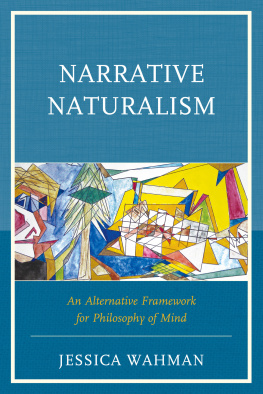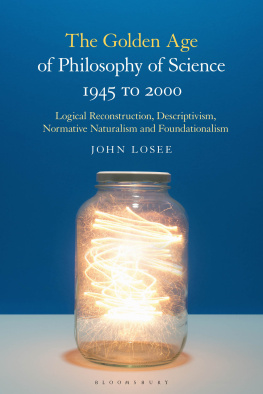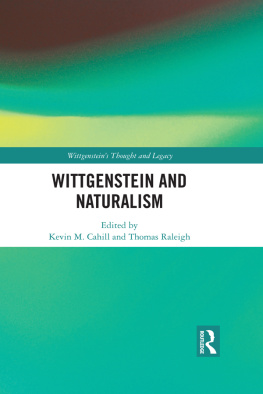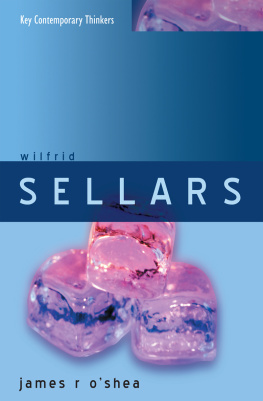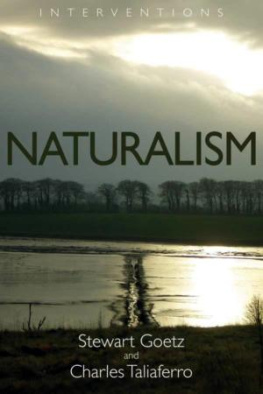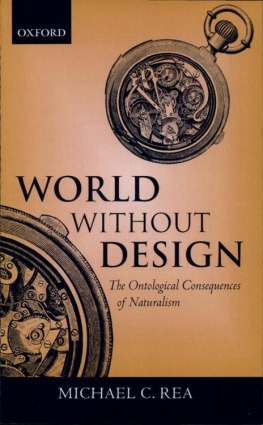Jessica Wahman - Narrative naturalism : an alternative framework for philosophy of mind
Here you can read online Jessica Wahman - Narrative naturalism : an alternative framework for philosophy of mind full text of the book (entire story) in english for free. Download pdf and epub, get meaning, cover and reviews about this ebook. year: 2015, publisher: Lexington Books, genre: Religion. Description of the work, (preface) as well as reviews are available. Best literature library LitArk.com created for fans of good reading and offers a wide selection of genres:
Romance novel
Science fiction
Adventure
Detective
Science
History
Home and family
Prose
Art
Politics
Computer
Non-fiction
Religion
Business
Children
Humor
Choose a favorite category and find really read worthwhile books. Enjoy immersion in the world of imagination, feel the emotions of the characters or learn something new for yourself, make an fascinating discovery.
- Book:Narrative naturalism : an alternative framework for philosophy of mind
- Author:
- Publisher:Lexington Books
- Genre:
- Year:2015
- Rating:4 / 5
- Favourites:Add to favourites
- Your mark:
- 80
- 1
- 2
- 3
- 4
- 5
Narrative naturalism : an alternative framework for philosophy of mind: summary, description and annotation
We offer to read an annotation, description, summary or preface (depends on what the author of the book "Narrative naturalism : an alternative framework for philosophy of mind" wrote himself). If you haven't found the necessary information about the book — write in the comments, we will try to find it.
Jessica Wahman: author's other books
Who wrote Narrative naturalism : an alternative framework for philosophy of mind? Find out the surname, the name of the author of the book and a list of all author's works by series.
Narrative naturalism : an alternative framework for philosophy of mind — read online for free the complete book (whole text) full work
Below is the text of the book, divided by pages. System saving the place of the last page read, allows you to conveniently read the book "Narrative naturalism : an alternative framework for philosophy of mind" online for free, without having to search again every time where you left off. Put a bookmark, and you can go to the page where you finished reading at any time.
Font size:
Interval:
Bookmark:
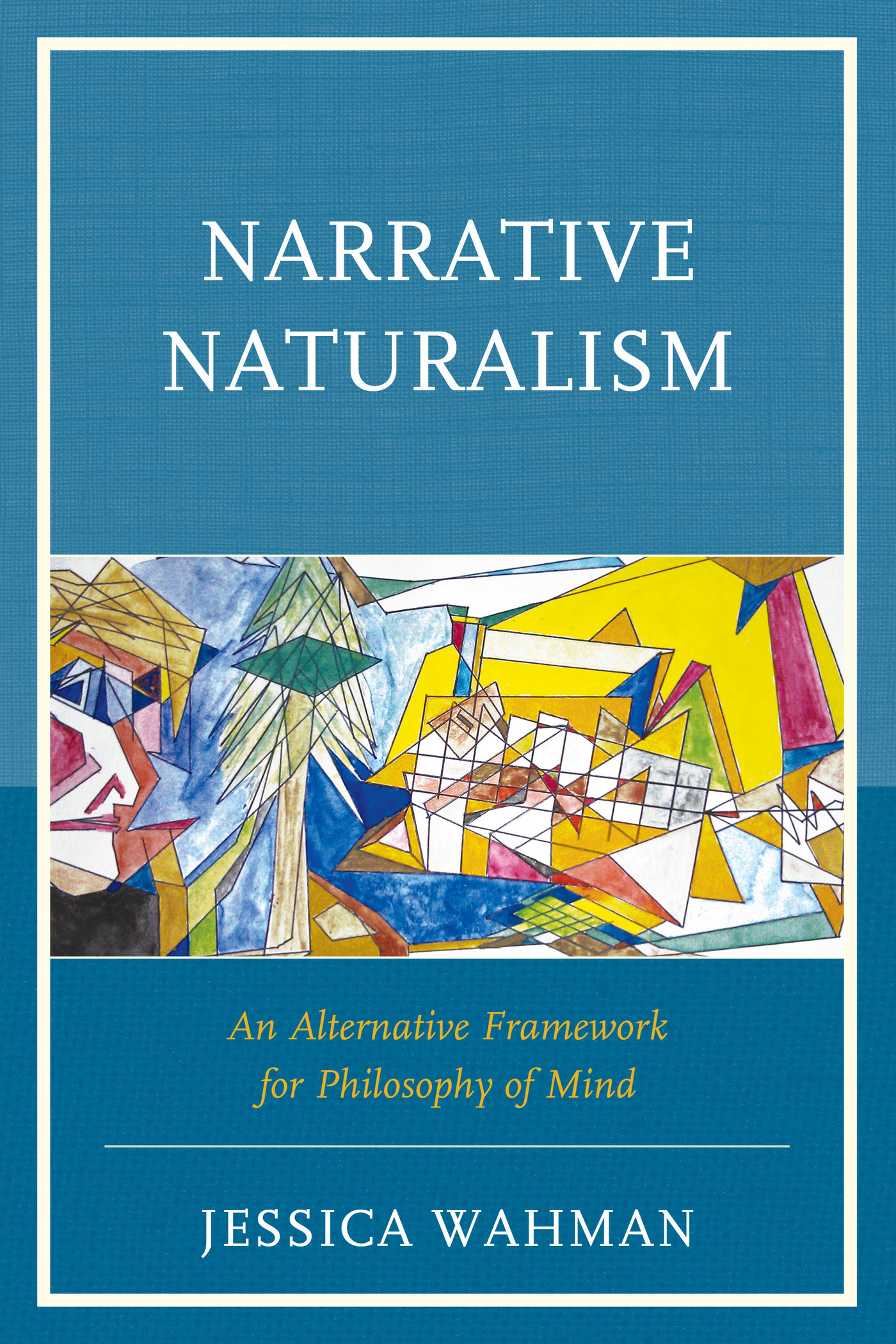
Narrative Naturalism
Narrative Naturalism
An Alternative Framework for
Philosophy of Mind
Jessica Wahman
LEXINGTON BOOKS
Lanham Boulder New York London
Published by Lexington Books
An imprint of The Rowman & Littlefield Publishing Group, Inc.
4501 Forbes Boulevard, Suite 200, Lanham, Maryland 20706
www.rowman.com
Unit A, Whitacre Mews, 26-34 Stannary Street, London SE11 4AB
Copyright 2015 by Lexington Books
All rights reserved. No part of this book may be reproduced in any form or by any electronic or mechanical means, including information storage and retrieval systems, without written permission from the publisher, except by a reviewer who may quote passages in a review.
British Library Cataloguing in Publication Information Available
Library of Congress Cataloging-in-Publication Data
Wahman, Jessica, 1968- Narrative naturalism : an alternative framework for philosophy of mind / Jessica Wahman.
pages cm
Includes bibliographical references and index.
ISBN 978-0-7391-8797-5 (cloth : alk. paper) -- ISBN 978-0-7391-8798-2 (electronic)
1. Naturalism. 2. Santayana, George, 1863-1952. 3. Philosophy of mind. I. Title.
B828.2.W34 2015
128'.2--dc23
2015012921
 TM The paper used in this publication meets the minimum requirements of American National Standard for Information Sciences Permanence of Paper for Printed Library Materials, ANSI/NISO Z39.48-1992.
TM The paper used in this publication meets the minimum requirements of American National Standard for Information Sciences Permanence of Paper for Printed Library Materials, ANSI/NISO Z39.48-1992.
Printed in the United States of America
To John Stuhr, love of my life, without whom this book would have been neither possible nor necessary.
This book is the result of long reflection and has come to fruition thanks, in no small part, to the suggestions of others and as a result of their encouragement. I am grateful to: Dickinson College, for support during the early stages of research and writing; my colleague Susan Feldman, for listening so thoughtfully to my nascent ideas and offering such constructive and provocative suggestions; Brian Henning and the Metaphysical Society of America, for giving me the opportunity to present an early version of my argument for pluralistic naturalism, which proved instructive in all sorts of ways; Associate Professor of Physics Lars English at Dickinson, for his willingness to read chapter 4 at the drop of a hat and for his valuable feedback on my characterization of emergent properties and explanatory interdependence in physics; and John Lysaker, for an inspiring turn of phrase essential to the development of my argument. Furthermore, I am ever grateful to David Dilworth, for introducing me to Santayanas work, and to Santayana himself, for his eloquent and inspiring vision of the world. I also thank Jana Hodges-Kluck, Kari Waters, and Hannah Fisher, editors at Lexington Books, for their belief in my project and their energies in seeing it through to completion. Finally, and most importantly, thanks to my husband, John Stuhr, who believes in me more than I do in myself and has encouraged me to accomplish things I doubted were possible. Though my successes never seem to surprise him, he has enabled me to surprise myself at what I can aspire to and achieve.
A Speculative Tale
In an age of empiricism, as ours is, one needs to address ways of knowing before one can address problems of being. Contemporary philosophers tend to look to the experiential, in various ways, to justify their claims, and we are rightly circumspect when it comes to metaphysical theories that claim to prove dimensions of reality that lie beyond the bounds of all perception. The philosophical orientation that I am proposing and calling narrative naturalism is, nonetheless, an attempt to conceive natural philosophy along more speculative lines so that consciousness, its objects, and material substance each have a real place in nature, despite the fact that most of these categories are not, strictly speaking, empirical ones. These other aspects should not, however, be interpreted as supernatural ghost stuff: my alternative to the reductive materialism that dominates contemporary naturalism aims to legitimate the reality of consciousness and its phenomenal and conceptual objects without running counter to the discoveries of the natural sciences. Instead, I place the scientific perspective within the context of a broader ontological story by considering the narrative elements in our knowing practices. Using the American philosopher George Santayanas epistemology to challenge the notion of literal knowledge, I illuminate the creative aspects of the technical practices of the sciences, affirm metaphysics as a literary enterprise, and thus conceptualize a natural reality that can accommodate a plurality of true interpretations of existence. As I will show, literary interpretation is as important as empirical observation for making sense out of the world, and this fact can shed light on an important role for speculative ontology in a scientific age.
Our present day is no different from Santayanas own in its skepticism toward theories involving claims about trans-experiential realities. Before he could write his ontological books on four noteworthy realms of being, Santayana needed to address the dominant attitudes of his time regarding the possibilities of knowledge. Material skepticism was the issue of his day, and much of Scepticism and Animal Faith, the text that serves as an introduction to his ontology, is aimed at undermining the epistemological assumptions of transcendentalism, idealism, and panpsychism, all of which he collectively dubbed psychologisms due to their tendencies to, often unwittingly, make mental life into a structured substance. Today, by contrast, these transcendentally focused theories are the outliers in philosophies of mind, and a materialism that embraces the conclusions, even if it does not utilize the methods, of the sciences and treats them as fundamental and literal truths of nature is instead broadly affirmed or assumed. Despite this difference, Santayanas epistemological propaedeutic is as useful for addressing the flaws in this materialism as it had been in challenging the reductionist tendencies of psychologism, in which matter is reduced to an imperfect, confused, or unnecessary idea. This is because Santayana challenges the very possibility of the certain, literal, and absolute knowledge that both approaches can at least tacitly embrace. Santayana exposes the inherently uncertain and metaphorical nature of knowledge so that knowing no longer connotes certainty or mastery but instead involves a sense of familiarity and a process involving faith and trust. This opens the way for a plurality of true interpretations of nature and poses a challenge to any philosophy that claims it can identify the foundations or first principles of everything else. Santayanas concept of animal faith, as he calls it, together with his notion of literary psychology as the imaginative products of dramatic sympathy provide the means to interpret knowledge claims as narrative constructions suitable for solving problems within a given context rather than a-perspectival or absolute appropriations of reality itself. The explanations we give, whether as professional philosophers or everyday people making sense of the world, are inextricably tied to the practice of composing dramatic storylines designed to invoke the sympathetic imaginations of our interlocutors, and the narratives we choose can influence the nature of the questions we pose to ourselves and each other as well as the responses that we generate to those questions.
Font size:
Interval:
Bookmark:
Similar books «Narrative naturalism : an alternative framework for philosophy of mind»
Look at similar books to Narrative naturalism : an alternative framework for philosophy of mind. We have selected literature similar in name and meaning in the hope of providing readers with more options to find new, interesting, not yet read works.
Discussion, reviews of the book Narrative naturalism : an alternative framework for philosophy of mind and just readers' own opinions. Leave your comments, write what you think about the work, its meaning or the main characters. Specify what exactly you liked and what you didn't like, and why you think so.

